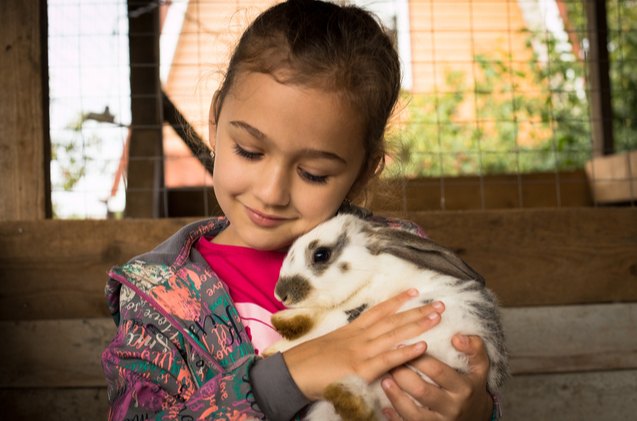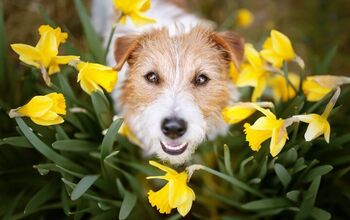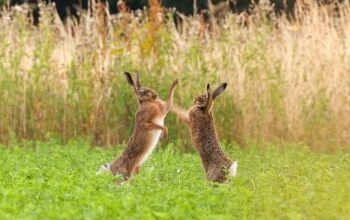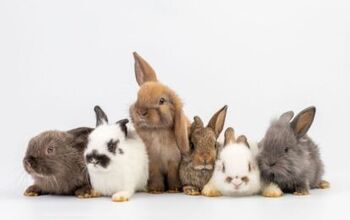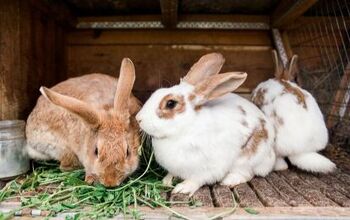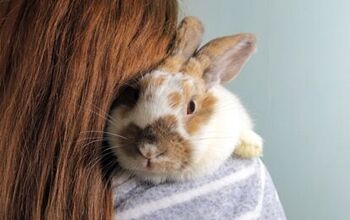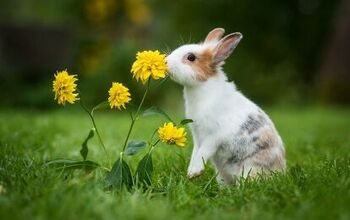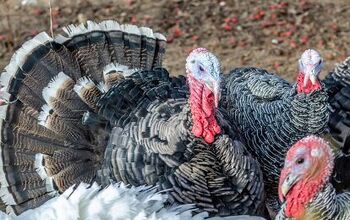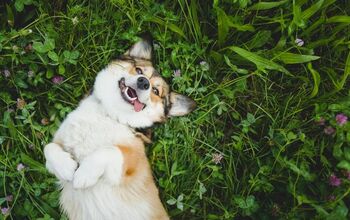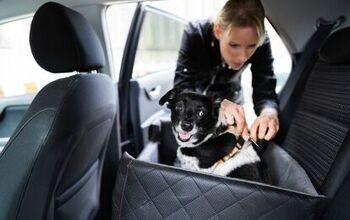10 Most Affectionate Rabbit Breeds

If you want a friendly, cuddly rabbit that will enjoy petting and spending time in your lap, there are a few things you need to consider before adopting one. The most important thing is to realize that socialization and your relationship with your pet to be are crucial if you want them to be sweet and snuggly: as prey animals, most rabbits have a tendency to be skittish and fearful, so you’ll need to be gentle with them and take it slow. Don’t expect them to be relaxed and affectionate straight away – they need a bit of time to warm up to you and realize they are safe by your side.
Next, the rabbit breed also plays a role in a rabbit’s temperament. Some breeds are friendlier than others, simply because they have been bred to be companions or show rabbits, so they are well accustomed to human contact and handling. In case you’re unsure which are the most affectionate rabbit breeds out there, we’ve rounded up some of the sweetest, friendliest rabbits around to help you make your decision.
#1 Lionhead Rabbit
Best known for the “wooly mane” which earned them the name, Lionhead rabbits are also known as gentle, sweet, and friendly bunnies. They are smart and love to play and socialize, and can be a great companion for kids and adults alike. A Lionhead rabbit, when properly socialized and treated with care, will develop a strong bond with their owner. These rabbits are classified as a dwarf breed and weigh 2.5 to 3.5 pounds on average. Easy to care for, the Lionhead rabbit also makes a good pet for beginners.
#2 English Lop Rabbit
A breed with a long tradition and many fans all over the world, the English Lop is a calm, easy-going rabbit that will love spending time with you. These bunnies have big, floppy ears that make them look adorable, and their friendly and laid-back personality only makes them only more appealing as pets. English Lop bunnies are often called the “dogs of the rabbit world” and are an excellent choice if you want a pet that’s curious, loving, and playful. Medium-sized, these rabbits usually weigh 9 to 10.5 lb.
#3 Polish Rabbit
The Polish rabbit is one of those breeds that loves attention and doesn’t hesitate to show their affection for those closest to them. It doesn’t surprise, then, that these bunnies often top the chart of the most affectionate rabbit pets! Friendly and calm, when socialized on time, they can even make great companions for kids. They won’t object to being picked up and snuggled, but as they are miniature rabbits that weigh 3 to 5 pounds on average, you should make sure your child is instructed on how to handle them properly.
#4 Holland Lop Rabbit
Another floppy-eared sweetie, the Holland Lop is a tender, playful bunny that will love to sit on your lap after some quality playtime and hopping around the house. Considered a dwarf breed, these rabbits are quite petite and weigh 2 to 4 pounds on average, so you will have to be gentle when handling them. Even though small, these rabbits are energetic and love to play, so count on having a generously sized enclosure where they can freely and safely explore and satisfy their curiosity.
#5 Mini Rex Rabbit
Easily recognized for their luxurious, velvety coat, Mini Rex rabbits are a delight to pet – and luckily, as they are a very sweet-natured and cuddly breed, they’ll quite enjoy your snuggle sessions, too. Quiet, calm, and docile, a Mini Rex can be a good choice for first-time owners as well, as they are not too demanding as pets. A small breed of rabbits, they will weigh between 3 and 4.5 pounds when fully mature,
#6 Harlequin Rabbit
Their stunning and unusual color combinations are certainly eye-catching, but the main reason why Harlequin rabbits are so popular is their wonderful personality. Their happy-go-lucky, outgoing nature makes them great if you want a pet bunny you can interact and have fun with. They are sweet and love attention, and won’t mind you petting them – on the contrary. Medium-sized, these rabbits weigh 6.5 to 9.5 pounds and will need plenty of space to hop around.
#7 Jersey Wooly Rabbit
You might have fallen in love with fluffy rabbits and wonder if there’s a breed that’s as affectionate as they are adorable – and your answer is the Jersey Wooly rabbit. Also known under the “no kick bunny” moniker, these rabbits are well known as docile, gentle, and don’t mind being picked up or cuddled. In fact, they are so affectionate and even-tempered that they are often recommended as rabbit pets for first-time owners or children. They are a dwarf breed, though, weighing only 1 to 3 pounds, so if you are getting one for your kid, be sure they are very gentle and careful when handling them.
#8 Dutch Rabbit
Gentle, curious, and sociable, the cute Dutch rabbit is a joy to be around. These bunnies have a lovely personality and make fast friends – they are very inquisitive and playful and it really doesn’t take long for one of these bunnies to warm up to you. Of course, you will have to put in the effort too, with timely socialization, but the effort will certainly pay off. Classified as a mini rabbit breed, Dutch rabbits weigh 4 to 5.5 pounds on average.
#9 English Spot Rabbit
Considered to be one of the oldest domesticated rabbit breeds, the English Spot rabbit is more than well accustomed to being around people and in the center of the spotlight. Granted, each rabbit is different, but in general, these bunnies tend to be gentle, affectionate, and enjoy being cuddled and handled. They are not lazy, either, so you can expect an English Spot rabbit to be active, playful, and always entertaining you with their antics. They weigh 5 to 8 pounds and are considered to be a medium-sized breed.
#10 Flemish Giant Rabbit
Big bunnies have big hearts, and the Flemish Giant rabbit proves it. These gentle giants are big softies at heart and will love getting petted and showered with attention. A Flemish Giant rabbit weighs 9 to 14 pounds on average, though, so be mindful of their size – they can be difficult to hold safely and shouldn’t be handled by children. This also means that they need a lot of space to be happy – but if you have room, you’ll be rewarded with a most loving companion.
Factors of Affection: What Makes a Bunny Friendly?
While the breed does play a significant role in the temperament of the rabbit, it’s not the only factor. There are various things that could affect your bunny’s behavior and sociability, so it’s important to consider all aspects before making a decision.
- Sex of the rabbit
There is a big difference in the temperament of a female rabbit (called a doe) and a male rabbit (called a buck). However, that’s when speaking about rabbits that haven’t been spayed or neutered – their hormones will vastly influence their behaviors. For instance, two male rabbits can become aggressive, and a female that isn’t spayed and bred consistently will also become moody and have outbursts of aggressive behavior. This is one of the reasons why it’s heartily recommended to spay or neuter your rabbit when they come of age – it will greatly improve their mental and physical health. Altered rabbits are more docile and gentle, they do not display negative behaviors (such as urine marking) and tend to be healthier and more long-lived than their unaltered cousins. Studies have shown that 85% of female rabbits will contract uterine cancer if not spayed before age 3, which can prove to be fatal, and greatly reduce the risk of testicular cancer in males.
- The way the rabbit was raised
Those earliest days when your rabbit was still a kittling will help form their personality. Ideally, they’d be exposed to human contact early on and will have a positive association with interaction and handling. Your rabbit might be stressed and timid because of negative experiences with their previous handler or owner, and it might affect the way they interact with you. This isn’t a reason for concern, though, as with the right approach and a lot of patience, you can teach your pet that they can feel safe and relaxed around you, which will lead them to open up to handling and petting.
- The way you treat your rabbit
It’s pretty rare to have a rabbit that’s cuddly, sweet, and relaxed from the get-go, no matter their breed. Rabbits are prey animals, first and foremost, which means that their instinct is to be wary and timid, so affection, friendliness, and playfulness usually come to the surface only when a bunny feels safe and relaxed. And it’s up to you to provide that! The first thing to have in mind is that you should be gentle and take things slow, never forcing your rabbit to come out of their comfort zone. If they are stressed when you pick them up, try petting them while they are sitting on the floor. Offer treats and toys, and don’t be pushy with interaction – as they warm up to you, they’ll probably come to truly cherish cuddles and playing with their owner.
- Their breed and lineage
Last but not least, your rabbit’s genes can also impact how affectionate they are. Rabbit breeds have been created for different purposes – some were meant to be commercially bred for their meat or fur, others have been selected as pets or show animals – and it might tell you a lot about their friendliness factor. Naturally, breeds that have been developed for the role of companionship tend to be more laid-back and gentle, and more accustomed to human interaction than those that have been bred commercially. This isn’t the golden rule, however, as there are many great pet rabbit breeds that have great success as pets, with a calm and docile demeanor that makes them suited for any kind of family. However, if you are a first-time owner and want to make sure you have greater chances of raising a friendly rabbit, you might want to go with a breed that’s been developed specifically for the role of a pet.
How to Bond with Your Rabbit
In the end, whichever bunny you pick out to be your companion for the next few years of your life, you will have to socialize them and build a bond between you. The first place to start is, of course, treats. Nothing will open your bunny up like some yummy snacks! Whenever your bunny comes near you, offer them a treat – in no time, they’ll start associating you with a positive reward and seek you out. You can use this throughout the socialization process, rewarding them for each step of the way – when they come near you when they allow you to pet them, pick them up, and so on.
As we’ve previously mentioned, rabbits are prey animals, and that should shape your behavior towards them. Understanding that they are timid will help you realize how to approach your relationship without causing stress for your pet. Don’t make loud sounds or sudden movements when handling your pet as it can cause an instinctive reaction for your pet to run away from you – and if you happen to be holding them at that moment, they can gravely injure themselves. If your child is interacting with a rabbit, instruct them not to corner them or try to pick them up, and generally, use a calm voice and let the bunny set the pace of their interaction.
When you’re trying to bond with your rabbit, patience will be your best ally. Although all rabbits are different, chances are that your bunny will be like the majority of their cousins – which means that they’ll need time before they trust you and show their gentle side. Rabbits are not like dogs, who tend to make fast friends, but if you are patient and persistent, you’ll gain a precious friend who’ll love to cuddle with you – and that’s definitely worth the wait.

A proud mama to seven dogs and ten cats, Angela spends her days writing for her fellow pet parents and pampering her furballs, all of whom are rescues. When she's not gushing over her adorable cats or playing with her dogs, she can be found curled up with a good fantasy book.
More by Angela Vuckovic



